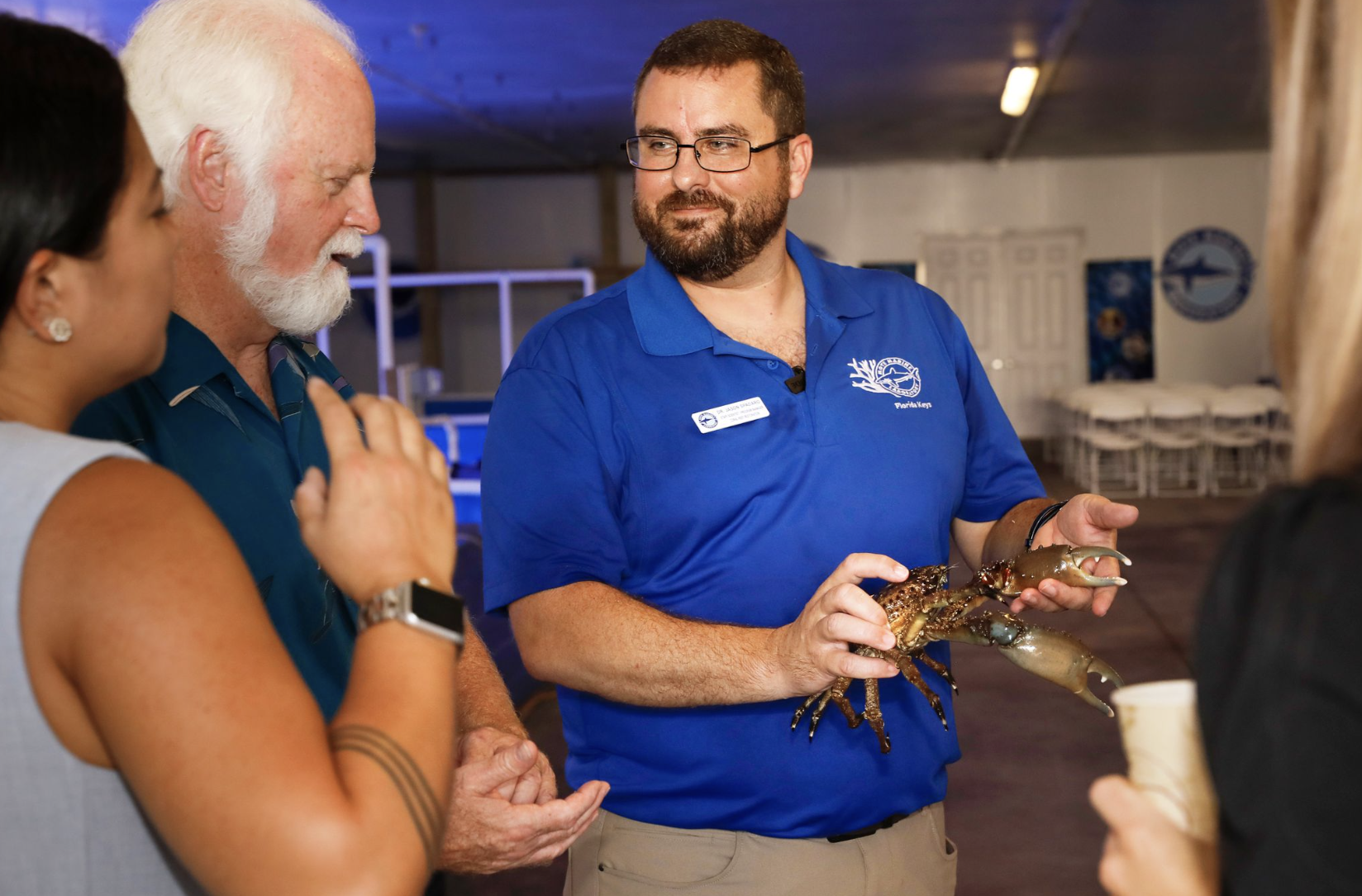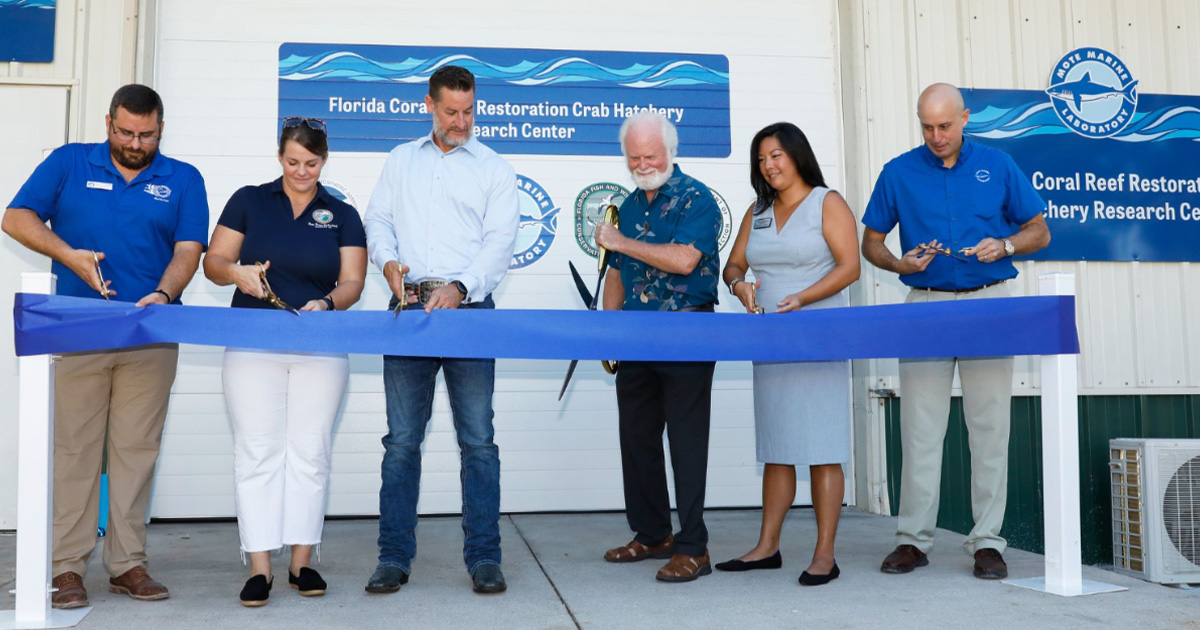Mote Marine Laboratory & Aquarium celebrated the official opening of its Florida Coral Reef Restoration Crab Hatchery Research Center, which is the first fully operational Caribbean king crab hatchery of its kind that will aid in its effort to save Florida’s coral reefs.
Mote President & CEO Dr. Michael P. Crosby and US Representative Steube cut the ribbon to the new facility alongside State Senator Gruters; State Representative McFarland; National Marine Sanctuary Foundation Vice President of External Affairs Shannon Colbert; Kevin Claridge, Vice President, Mote's Sponsored Research and Coastal Policy Programs; and Coral Reef Restoration Research Program Manager Dr. Jason Spadaro.
"Florida's Coral Reef is a critical environmental and economic asset for both the state of Florida and the United States," said Rep. Steube. "Mote Marine Laboratory is a leader in coral reef research and restoration in the Florida Keys and I'm pleased to support the Coral Reef Restoration Crab Hatchery Research Center as a critical component of the restoration toolbox going forward. I am confident that this effort, alongside the numerous other pioneering innovations from Mote, will aid in reversing the significant functional decline we've witnessed on the reef in recent decades."
The new facility was funded in part by an award from the National Marine Sanctuary Foundation as part of the Mission: Iconic Reefs (M:IR) Capacity Building Grant program.
While Mote is a long-standing innovator and leader in coral restoration research and developing methods that are being used by coral restoration practitioners as part of M:IR, it now also stands at the forefront of mitigating algal overgrowth and preventing, or potentially reversing, seaweed dominance—both significant challenges to successful long-term coral reef restoration—by growing a program to bolster populations of a key reef herbivore, the Caribbean king crab.
“Today marks the beginning of Mote’s next step in its comprehensive, science-based coral reef restoration strategy, building off of our decades-long history of shifting the paradigm of how we approach coral reef restoration science,” said Dr. Crosby. “Thanks to the support of our elected officials, the National Marine Sanctuary Foundation, and NOAA’s Mission: Iconic Reefs, we will be able to produce 34,000 Caribbean King crabs in this new facility within the next four years as we grow our holistic coral reef community restoration approach under the leadership of Mote’s Coral Reef Restoration Research Program Manager, Dr. Jason Spadaro."
In February of 2022, Dr. Jason Spadaro was working as a Postdoctoral Research Fellow at Mote’s Elizabeth Moore International Center for Coral Reef Research & Restoration (IC2R3) on Summerland Key when its team hatched Mote’s first clutch of Caribbean king crabs. Caribbean king crabs consume more algae than any species of parrotfish in the Caribbean and rival the consumption rates of urchins. Further, the crabs readily consume algae that are chemically defended and avoided by other grazers in the region. Eventually, these new crabs will be added to coral reef restoration sites, reducing the competition between algae and corals, allowing Mote’s restored corals to grow faster.
 Coral Reef Restoration Research Program Manager Dr. Jason Spadaro shows Mote President & CEO Dr. Michael P. Crosby and National Marine Sanctuary Foundation Vice President of External Affairs Shannon Colbert a large male Caribbean King crab in Mote's new Florida Coral Reef Restoration Crab Hatchery Research Center. (Image credit: Mote Marine Laboratory & Aquarium)
Coral Reef Restoration Research Program Manager Dr. Jason Spadaro shows Mote President & CEO Dr. Michael P. Crosby and National Marine Sanctuary Foundation Vice President of External Affairs Shannon Colbert a large male Caribbean King crab in Mote's new Florida Coral Reef Restoration Crab Hatchery Research Center. (Image credit: Mote Marine Laboratory & Aquarium)
This Caribbean king crab clutch would eventually be introduced onto Florida’s Coral Reef as part of the ongoing M:IR initiative led by the National Oceanic and Atmospheric Administration (NOAA) in partnership with Mote and other organizations.
Caribbean king crabs have emerged as champions in the fight to rescue threatened coral reefs. Their unique ability to mitigate the impending threat of algae overgrowth was generally masked by their low natural abundance throughout the region. By increasing their abundance, they facilitate the growth, survival, and recruitment of corals, dramatically improving coral reef restoration outcomes.
These crabs, with their omnivorous appetites, play a crucial role in maintaining the delicate equilibrium of coral ecosystems. As algae populations surge due to external factors, they can smother and weaken coral structures, leaving them vulnerable to disease and bleaching events.
However, Caribbean king crabs are excellent grazers, scouring reefs for algae. By curbing algae growth, these crabs foster a healthier environment for coral growth and settlement, reinforcing the resilience of coral reef communities against the mounting challenges posed by human effects and environmental stressors.
This species will be a critical component to the long-term success of coral reef restoration efforts.
“We understand the potential of the Caribbean king crab in supporting coral recruitment and reef fish diversity,” said Spadaro. “With this new facility, we will continually manage aquaculture systems that support mass production and survival of crabs to support large-scale coral reef restoration.”
The 6,000 square-foot hatchery facility is now home to more than one hundred Caribbean king crabs that will serve as the initial broodstock at Mote’s Aquaculture Research Park in Sarasota, FL. The operational strategy for the facility is to gradually increase this to 300-400 adult broodstock and, eventually, produce an estimated 250,000 juvenile crabs every year. Once the baby crabs reach a releasable size—three to five months after hatching—they will be screened by a veterinarian before being transported to Summerland Key for release onto restoration sites along Florida’s Coral Reef.



